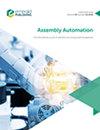Developing a firewater deluge monitoring and forecasting system based on GA-ARMA model
IF 1.7
4区 计算机科学
Q3 AUTOMATION & CONTROL SYSTEMS
引用次数: 2
Abstract
Purpose The firewater deluge system (FDS) can provide water automatically through a deluge valve when a fire breaks out. However, there are many fire hazards caused by the abnormal operating state of the FDS. To monitor and predict the working state of the FDS, this paper aims to propose a firewater deluge monitoring and forecasting system using the Internet of Things (IoT) technology. Design/methodology/approach The firewater deluge monitoring and forecasting system consists of three layers: the sensing layer, network layer and application layer. The firewater pressure obtained by the monitoring nodes was transmitted to the local gateway and then to the remote monitoring center. In the application layer, an autoregressive moving average (ARMA) model was put forward to forecast the firewater pressure. Furthermore, a genetic algorithm (GA) was proposed to perfect the order determination method of the ARMA model. Finally, a Web application was developed to display the real time and predicted working status of the FDS. Findings The predicted results show that the ARMA model improved by the GA (GA-ARMA) is significantly better than traditional ARMA models in terms of mean relative error, mean absolute error and mean square error. Moreover, the proposed system is demonstrated to be effective, and an early warning can be alerted to remind users of repairing abnormal FDS equipment ahead of fire dangers. Originality/value The proposed system cannot only be applied to the FDS of all buildings to avoid fire hazards by monitoring and predicting the working state of the FDS, but can also be widely used in other fields, such as environmental monitoring, intelligent logistics and intelligent transportation.开发基于GA-ARMA模型的洪水监测预报系统
目的消防水淋系统(FDS)可以在火灾发生时通过雨淋阀自动提供水。然而,由于FDS的异常运行状态导致了许多火灾隐患。为了监测和预测消防系统的工作状态,本文提出了一种基于物联网(IoT)技术的消防洪水监测预报系统。该系统由传感层、网络层和应用层三层组成。监控节点采集到的消防水压力数据通过本地网关传输到远程监控中心。在应用层,提出了一种自回归移动平均(ARMA)模型来预测火水压力。在此基础上,提出了一种遗传算法来完善ARMA模型的阶数确定方法。最后,开发了一个Web应用程序来实时显示和预测FDS的工作状态。结果表明,遗传算法改进的ARMA模型(GA-ARMA)在平均相对误差、平均绝对误差和均方误差方面都明显优于传统的ARMA模型。此外,该系统被证明是有效的,可以发出预警,提醒用户在火灾危险之前修理异常的FDS设备。本文提出的系统不仅可以应用于所有建筑的消防系统,通过监测和预测消防系统的工作状态来避免火灾隐患,还可以广泛应用于其他领域,如环境监测、智能物流、智能交通等。
本文章由计算机程序翻译,如有差异,请以英文原文为准。
求助全文
约1分钟内获得全文
求助全文
来源期刊

Assembly Automation
工程技术-工程:制造
CiteScore
4.30
自引率
14.30%
发文量
51
审稿时长
3.3 months
期刊介绍:
Assembly Automation publishes peer reviewed research articles, technology reviews and specially commissioned case studies. Each issue includes high quality content covering all aspects of assembly technology and automation, and reflecting the most interesting and strategically important research and development activities from around the world. Because of this, readers can stay at the very forefront of industry developments.
All research articles undergo rigorous double-blind peer review, and the journal’s policy of not publishing work that has only been tested in simulation means that only the very best and most practical research articles are included. This ensures that the material that is published has real relevance and value for commercial manufacturing and research organizations.
 求助内容:
求助内容: 应助结果提醒方式:
应助结果提醒方式:


